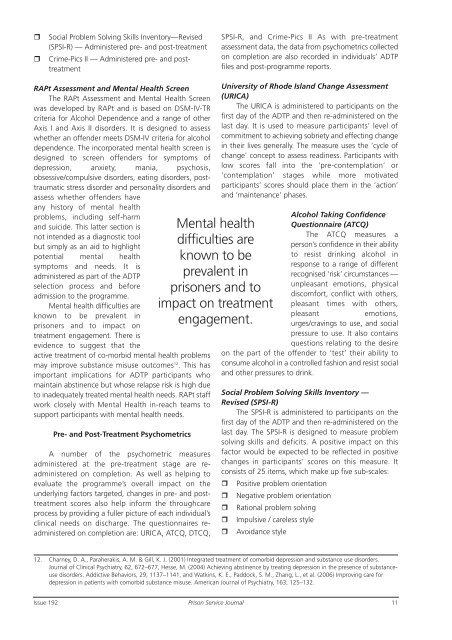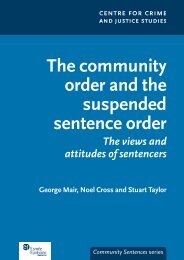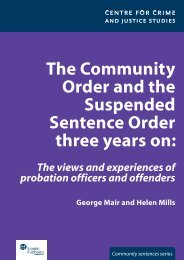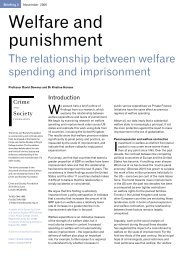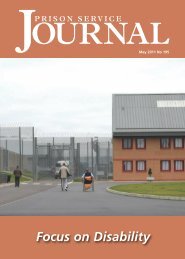The Alcohol Dependency Treatment Programme(ADTP) is a six-week, intensive offending behaviourprogramme aimed at medium — to high-risk maleoffenders with a history of alcohol dependence. TheADTP introduces coping and relapse-preventions skills,addresses skills deficits that underlie both alcoholdependence and violent offending; the programmeactively links participants to ongoing sources of supportsuch as Alcoholics Anonymous (AA), and guidesparticipants in need of ongoing support on release intoappropriate community programme. The ADTP wasdeveloped by the Rehabilitation for Addicted PrisonersTrust (RAPt) and accredited by the Correctional ServiceAccreditation Panel (CSAP) in 2008.A twelve-step approach forms the basis of theADTP because this approach has been shown to beparticular effective for offenders with severe levels ofdependence and low levels of social support 10 .Additionally, the approach has been shown to increasethe likelihood of successful engagement withAlcoholics Anonymous (AA) 11 Alcoholics Anonymousprovides an ongoing, free, nationwide, readily availablenetwork of support which is independent of thecriminal justice system, yet accessible both in prison andin the community. Such support is a crucial source ofsupport, offering continuity between treatment, prisonand the transition back into the community. It is alsoimportant for alcohol dependent offenders because itprovides a network of sober friends outside of prison ina society which is otherwise widely accepting of alcoholuse.The source of data used in this paper comes fromtwelve consecutive cohorts of participants on the ADTPat HMP Bullingdon between April 2007 and January2009. There were a total of 134 participants during thisperiod; 107 graduated and 27 were de-selected.Despite the small sample size, the findings areencouraging: A comparison of pre- and post-treatmentpsychometric scores indicates the programme producessignificant changes across a range of dynamic riskfactors for re-offending. Participants’ post-treatmentfeedback also indicates the programme is effective inlinking offenders to peer and professional support andincreasing the likelihood of affiliation with thefellowship of Alcoholics Anonymous (AA).MethodParticipant SelectionAll applicants undergo a ComprehensiveSubstance Misuse Assessment (CSMA) prior to beingassessed further for the ADTP. This includesquestionnaires covering the offender’s drug and alcoholhistory, social support, history of mental healthproblems and other treatment-related needs.Applicants’ eligibility for the ADTP is then assessedaccording to the following criteria: Medium-high risk of re-offending A history of alcohol dependence Alcohol dependence as a significant risk factor forre-offendingRisk of re-offending is assessed through the OASysassessment where it is operational within theestablishment. Alternatively, the sentence planningprocess using the sentence planning risk predictor willbe used.History of alcohol dependence is assessed usingRAPt’s Substance Dependence Assessment and theCSMA. The RAPt Substance Dependence Assessmentevaluates whether an offender meets DSM-IV-TRcriteria for alcohol dependence. The CSMA providesmore general information, through open-endedquestions, about the offender’s use of alcohol.Where someone has been assessed as meetingDSM-IV criteria for alcohol dependence, theirdependence will be assumed to be a significant riskfactor for re-offending even if it was not a factor in anyof their previous crimes. However, applicants with aclear history of alcohol-related offending are givenpriority.A range of measures are used to assessparticipants before they begin treatment: Prison and Probation Offender AssessmentSystem (OASys) CARAT’s Comprehensive Substance MisuseAssessment (CSMA) The RAPt Assessment and Mental Health Screen(RAPt Assessment) Part One: Participant Information(Demographic information, offending historyand drug use history) Part Two: Substance DependenceAssessment Part Three: Mental Health Screen University of Rhode Island Change Assessment(URICA) — Administered pre- and post-treatment Alcohol Taking Confidence Questionnaire (ATCQ)— Administered pre- and post-treatment Drug Taking Confidence Questionnaire (DTCQ) —Administered pre- and post-treatment10. Project MATCH Research Group (1997) Matching alcoholism treatments to client heterogeneity: Project MATCH post-treatmentoutcomes. Journal of Studies on Alcohol, 58, 7-29.11. For example see Fiorentine, R. and Hillhouse, M.P. (2000) Drug treatment and 12-step program participation: The additive effects ofintegrated recovery activites. Journal of Substance Abuse Treatment, 18, 65-74 and Kelly, J.F. (2003) Self-help for substance-usedisorders: History, effectiveness, knowledge gaps, and research opportunities. Clinical Psychology Review, 23, 639-663.10 Prison Service JournalIssue 192
Social Problem Solving Skills Inventory—Revised(SPSI-R) — Administered pre- and post-treatmentCrime-Pics II — Administered pre- and posttreatmentSPSI-R, and Crime-Pics II As with pre-treatmentassessment data, the data from psychometrics collectedon completion are also recorded in individuals’ ADTPfiles and post-programme reports.RAPt Assessment and Mental Health ScreenThe RAPt Assessment and Mental Health Screenwas developed by RAPt and is based on DSM-IV-TRcriteria for Alcohol Dependence and a range of otherAxis I and Axis II disorders. It is designed to assesswhether an offender meets DSM-IV criteria for alcoholdependence. The incorporated mental health screen isdesigned to screen offenders for symptoms ofdepression, anxiety, mania, psychosis,obsessive/compulsive disorders, eating disorders, posttraumaticstress disorder and personality disorders andassess whether offenders haveany history of mental healthproblems, including self-harmand suicide. This latter section isnot intended as a diagnostic toolbut simply as an aid to highlightpotential mental healthsymptoms and needs. It isadministered as part of the ADTPselection process and beforeadmission to the programme.Mental health difficulties areknown to be prevalent inprisoners and to impact ontreatment engagement. There isevidence to suggest that theactive treatment of co-morbid mental health problemsmay improve substance misuse outcomes 12 . This hasimportant implications for ADTP participants whomaintain abstinence but whose relapse risk is high dueto inadequately treated mental health needs. RAPt staffwork closely with Mental Health in-reach teams tosupport participants with mental health needs.Pre- and Post-Treatment PsychometricsA number of the psychometric measuresadministered at the pre-treatment stage are readministeredon completion. As well as helping toevaluate the programme’s overall impact on theunderlying factors targeted, changes in pre- and posttreatmentscores also help inform the throughcareprocess by providing a fuller picture of each individual’sclinical needs on discharge. The questionnaires readministeredon completion are: URICA, ATCQ, DTCQ,Mental healthdifficulties areknown to beprevalent inprisoners and toimpact on treatmentengagement.University of Rhode Island Change Assessment(URICA)The URICA is administered to participants on thefirst day of the ADTP and then re-administered on thelast day. It is used to measure participants’ level ofcommitment to achieving sobriety and effecting changein their lives generally. The measure uses the ‘cycle ofchange’ concept to assess readiness. Participants withlow scores fall into the ‘pre-contemplation’ or‘contemplation’ stages while more motivatedparticipants’ scores should place them in the ‘action’and ‘maintenance’ phases.Alcohol Taking ConfidenceQuestionnaire (ATCQ)The ATCQ measures aperson’s confidence in their abilityto resist drinking alcohol inresponse to a range of differentrecognised ‘risk’ circumstances —unpleasant emotions, physicaldiscomfort, conflict with others,pleasant times with others,pleasantemotions,urges/cravings to use, and socialpressure to use. It also containsquestions relating to the desireon the part of the offender to ‘test’ their ability toconsume alcohol in a controlled fashion and resist socialand other pressures to drink.Social Problem Solving Skills Inventory —Revised (SPSI-R)The SPSI-R is administered to participants on thefirst day of the ADTP and then re-administered on thelast day. The SPSI-R is designed to measure problemsolving skills and deficits. A positive impact on thisfactor would be expected to be reflected in positivechanges in participants’ scores on this measure. Itconsists of 25 items, which make up five sub-scales: Positive problem orientation Negative problem orientation Rational problem solving Impulsive / careless style Avoidance style12. Charney, D. A., Paraherakis, A. M. & Gill, K. J. (2001) Integrated treatment of comorbid depression and substance use disorders.Journal of Clinical Psychiatry, 62, 672–677, Hesse, M. (2004) Achieving abstinence by treating depression in the presence of substanceusedisorders. Addictive Behaviors, 29, 1137–1141, and Watkins, K. E., Paddock, S. M., Zhang, L., et al. (2006) Improving care fordepression in patients with comorbid substance misuse. American Journal of Psychiatry, 163, 125–132.Issue 192 Prison Service Journal11


